pecu-, pecun-
(Latin: cattle, property in cattle; private property; money; particular)
From the Old Testament: Ecclesiastes, V, 10 (c. 250 B.C.). It is probably the origin of "The More he has, the more he wants."
It is said that the multimillionaire, John D. Rockefeller, was once asked, "How much money does it take to make a man happy?" His response: "Just a little more!"
2. Describing a condition in which there is not enough money to pay for necessities: Jacob was an impecunious student who was attending a college and so he had to work part time in order to pay for his expenses.
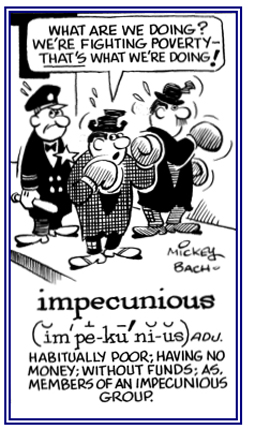
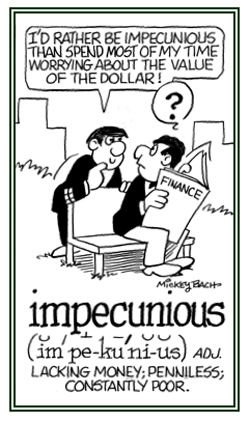
Go to this Word A Day Revisited Index
so you can see more of Mickey Bach's cartoons.
Jacob was so poverty-stricken after losing his job that he had to live quite impecuniously in his car instead of in an apartment.
Another way of saying, "Money can buy anything or anyone." In addition, it could mean, "With enough money, one can have everything he/she wants; except good health and eternal life."
From Marcus Tullius Cicero (106 - 43 B.C.). Cicero's voluminous writings include poetry (both his own and translations from the Greek); orations (fifty-eight have survived, forty-eight are lost); compositions about rhetoric, philosophy, morals, and politics; as well as letters. His formal discourses are important historically because they contain much information on ancient thoughts. His letters are the primary source for our knowledge of the period.
After Caesar's murder, Cicero violently attacked Mark Antony in his celebrated Philippics. When the second triumvirate was formed, he was put on the list of those who were to be killed and was murdered by Antony's agents.
2. The genetics, breeding, nutrition and housing of domesticated animals; animal husbandry: Floyd needed to take courses in pecudiculture, as well as those for zoology, which he needed in order to become a veterinarian.
3. Etymology, from Latin pecud-em, "a beast"; in plural, "cattle" + "culture".
The word format is based on agriculture, horticulture, floriculture, etc.
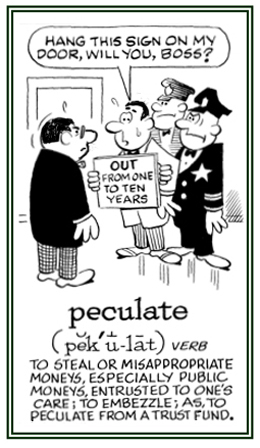
Go to this Word A Day Revisited Index
so you can see more of Mickey Bach's cartoons.
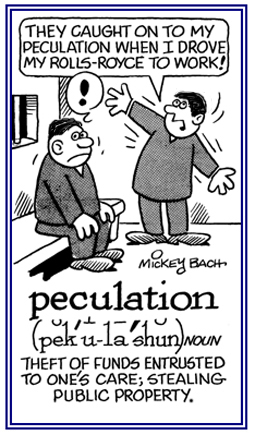
Go to this Word A Day Revisited Index
so you can see more of Mickey Bach's cartoons.
2. Etymology: from Latin peculatus, past participle of peculari, "to embezzle public money", from peculium, "private property"; literally, "property in cattle" which in the past has represented "wealth".
2. Uncommon; out of the ordinary: Clara had a peculiar hobby of collecting words none of which her friends ever heard of.
3. Distinctive in nature or character from others: Mabel had a peculiar habit of eating ice cream for breakfast!
Lionel, who was from Texas, used an expression quite peculiar to Canadians and so they had a hard time understanding what he was saying!
4. Belonging exclusively to a person, group, or something: Too many dictionaries have a peculiar procedure of using another form of the word entry that is being defined; for example, "An anthropologist is someone who studies anthropology."5. Common or normal for a certain place or circumstance: A peculiar habit of the rich ladies at the famous races in Ascot, England, is to show off their fancy hats and clothes.
6. Etymology: from Latin peculiaris as "one's own", equivalent to peculi(um), "private property" (derivative of pecu, "flock, farm animals"; literally, "property in cattle"; akin to pecus, "cattle" from which came pecunia, "money" because cattle represented wealth before money became the main element of such a status).
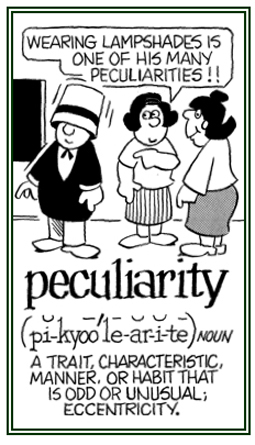
Go to this Word A Day Revisited Index
so you can see more of Mickey Bach's cartoons.
2. A private or exclusive possession, property, or appurtenance: The peculium Mildred inherited from her mother was a cameo, one which her great great grandmother had worn on many special occasions.
Cross references of word families related to: "individual, personal": idio-; privat-, priv-.

